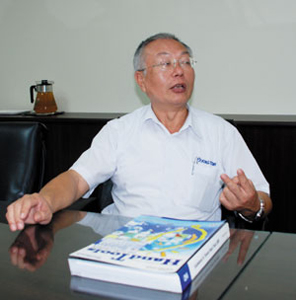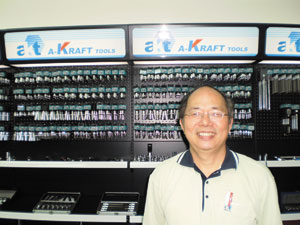T-Team Formed to Tap Synergy of Taiwan's Hand-tool Makers
2010/07/30 | By Steve ChuangTaking after the success of Taiwan's A-team, an alliance among leading bicycle brands as Giant, Merida and subcontractors in Taiwan, 14 ambitious hand tool makers formed the “T-team” on July 22, 2009 in Taichung County, central Taiwan, aided by the Corporate Synergy Development Center (CSDC), to sharpen their core competency through closer cooperation, aiming to build synergy to cope with the ever-challenging global market.
Headed by bigger “core companies” namely King Tony Tools Co., Ltd. and A-Kraft Tools Manufacturing Co., Ltd., the T-Team also includes smaller but globally competitive partners as Torque-Tech Precision Co., Ltd., Win Sam Industrial Co., Ltd. and Quan Tian Tools Co., Ltd., whose overall production value totals NT$2 billion (about US$61.53 million).
The CSDC noted that overall production value of Taiwan's tool industry has grown 6% on average from 2003 to 2008 to reach NT$61.5 billion (US$1.89 billion) last year; but such encouraging figure belies the ASP (average selling price): US$6.5 per kilogram in 2008, only one-third that of tools made in the U.S. and Japan. That simply means Taiwan-made hand tools still cannot command equal prices of western-made counterparts, even if delivering similar quality.

Duplicating Success
Also the CSDC added that, dampened by the global downturn and literal dumping by Chinese rivals of DIY tools globally, Taiwan's hand tool industry's exports plummeted in value by 50% year-to-year in the first half of 2009. To help hand tool makers in Taiwan turn around such unfavorable odds, the CSDC hence decided to duplicate the A-Team's success by setting up the T-Team.
It's literally taken for granted that the T-Team's chance of success would multiply with the two leading firms' altruism, hinging on their willingness to help the other, smaller members to sharpen competitive edge initially. The old adage applies in the traditional manufacturing sector after all: those with sufficient financing will stay afloat through tougher times. King Tony posted annual revenues of NT$1.2 billion (US$36.92 million) in 2008, with A-Kraft trailing at NT$500 million (US$15.38 million).
True Founder
Inspired by the success of global distributors who have built private brands, subcontract most production, and focus on setting up distribution networks to form value-chains among insiders, Mark Wu, senior manager at the King Tony Group, is the driver behind the T-Team, who single-mindedly has been attempting to rebuild a value-chain in the hand tool sector in Taiwan. The plan basically involves helping each insider to streamline uncompetitive operations, by focusing on core business via tapping individual competency, through resource integration made available in the partnership that helps to achieve business differentiation.
With 90% of total sales generated from own-brand products, King Tony is a very successful OBM (original brand manufacturer) in Taiwan who owns branches in France, Mexico and other countries, supplying over 10,000 professional-grade hand tools, including sockets, impact socket accessories, wrenches, hex hey wrenches, screwdrivers, pliers, tool trolleys, chests, impact wrenches, auto repair tools and torque wrenches. Backed by strong marketing and sound distribution networks, the company has effectively shipped own-brand tools to literally every market worldwide.
Blind Branding
With more than a decade of branding experience, Wu knows how such strategy works, but points out a pervasive problem in the line: many makers in Taiwan have been literally hypnotized by governmental promotions that have turned branding into elixir, able to fix any weakness afflicting a hand tool maker. “Most insiders, despite being eager to build private brands, have fuzzy concepts of their own core competency. Ultimately, they waste efforts on going beyond familiar territory and end up flopping.” For example, a hand tool maker specializing in developing metallic alloys would not be wise to build a brand promoting expertise in mechanical design.
Also, Wu added, most Taiwanese hand tool makers are SMEs (small and medium enterprises) who boast excellent flexibility in production, but, advantage notwithstanding, often cannot achieve economy of scale, which results for example in freight wastage.
Such waste in freight was not a major issue some years ago when typically, Wu said, contract orders for DIY tools were comparatively large, hence allowing makers to turn profits regardless. But no longer for now foreign buyers tend to place smaller orders with greater varieties of middle-to-high-end products, making freight a significant cost factor. Plus the stark fact is that many small hand tool makers in Taiwan lack higher, practical education, hence also scientific management know-how, so operators and hired hands, sometimes compounded by having to employ incompetent relatives, often adopt outdated methods as haphazard inventorying.
“The key is to help a maker focus entirely on certain production processes, those that are within its expertise, then a company can apply core competence to create value for not only itself but also the whole sector. The next step would be to build brands that can effectively help raise profiles of Taiwan-made hand tools. This is the T-Team's ultimate objective,” Wu said.

Mutually Beneficial
If Wu's blueprint to rebuild a value-chain in the hand tool sector in Taiwan is realized, then the T-Team stands to benefit from inventory sharing, reduced costs on procurement and freight, and continual benchmarking.
In fact the two leading T-Team members are already deriving mutual benefits from sharing inventories: the two companies expect to save 5-8% a year, Wu said, as well as help to minimize operating losses due to idle capacity and inventory shortage.
Meanwhile King Tony and A-Kraft are negotiating to jointly procure raw materials, shipping services and insurance, aiming to further reduce operating costs and enhance operation efficiency. Furthermore, Wu said, the synergy would enable T-Team members to offer wider product ranges to make procurement for foreign buyers more convenient.
“Currently we are still coping with teething pains as the smaller members still need technical help from the two leaders and CSDC,” Wu said. “But I believe the partnership will succeed for every member is eager to become stronger and can fully identify with the T-Team.”
Second Motivator
Also believing in the worthy cause of Wu's plan to strengthen Taiwan's hand tool sector's capability and professionalism globally, Louis Chen, chairman of A-Kraft, has accepted CSDC's invitation and is set to offer more resources to put the T-Team on-track.
Founded in 1988 in Taichung County, central Taiwan, A-Kraft specializes in production and promotion of auto repair tools, including sockets and accessories, extensions, ratchet handles, wrenches, tool sets and roller cabinets, about 70% of which are exported on an OEM (original equipment manufacturer) basis and the remainder as OBM orders. With over 80% of sales generated in Europe's professional segment, the company is known as a globe-caliber supplier.
A-Kraft will make significant contribution to the T-Team in the form of sharing its fully computerized organizational and production management, helping to enhance members' operation efficiency to world-class standards, according to Chen. In fact, no one in the line can match A-Kraft's fully computerized operations, considered essential to enhance core competency.
Almost Fully ERP
“After a few years of concentration on adopting computerized management, we have installed 95% of our operations with ERP (enterprise resource planning) system,” Chen said. “To make sure all systems and application software are compatible with our organization from the ground up, A-Kraft has even set up a computer engineering department, in which a small team of dedicated software engineers work out practical solutions to improve operation efficiency.”
So far, A-Kraft has adopted many in-house developed software and systems for inventory monitoring, sales logging, customer relationship management, labor and production scheduling, performance auditing, personnel management etc. Unfortunately e-management is as rare in Taiwan's hand tool sector as a bookkeeper in the line with a degree from the Wharton School of Business, even rarer still would be the establishment of an in-house computer engineering division. However A-Kraft has proven, by bucking convention, that computerizing operations truly can help sharpen efficiency above its peers.
“We will not hold back sharing our experience in e-management with T-Team members,” Chen said. “Meanwhile A-Kraft has started building online an experience exchanging and e-learning platform, aiming to speed up members' use of information technology to enhance operation efficiency and performance.”




